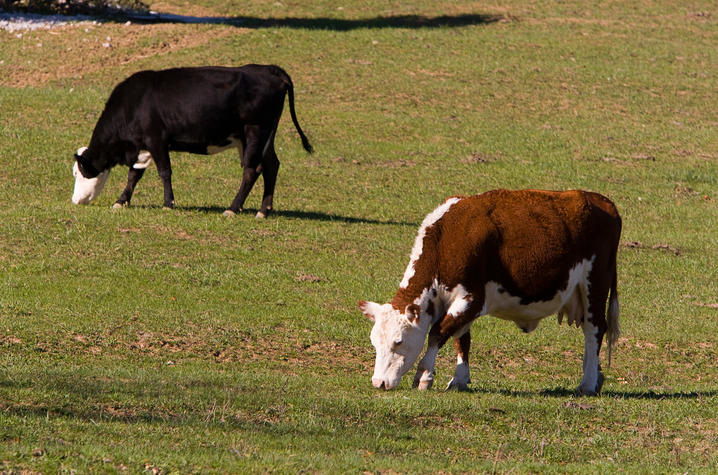New grant awarded to investigate critical issue affecting beef production

LEXINGTON, Ky. (July 19, 2024) —The University of Kentucky Martin-Gatton College of Agriculture, Food and Environment (CAFE) has been awarded a $300,000 grant to explore the potential of 5-hydroxytryptophan (5-HTP) in mitigating fescue toxicosis in beef cattle. The research project, spearheaded by UK Department of Animal and Food Sciences Assistant Professor Ronald Trotta, aims to address this pervasive issue affecting beef production, especially in regions dominated by endophyte-infected tall fescue.
Trotta says the study addresses a $2 billion issue. Fescue toxicosis reduces the weaning weight of nine million U.S. beef calves per year by an average of 50 pounds each.
Fescue toxicosis, primarily caused by ergot alkaloids — a group of compounds derived from the fungus Epichloë coenophiala — in tall fescue, presents many problems for cattle. These include reduced feed intake, increased vasoconstriction and susceptibility to heat stress and compromised gut integrity. This condition is especially relevant in the Bluegrass State, the leading beef cattle-producing state east of the Mississippi River, where 14 million hectares are covered with this type of fescue.
“We will be focusing on the three primary fescue toxicosis symptoms,” Trotta said. “The ergot alkaloids in fescue bind to specific receptors in blood vessels, causing vasoconstriction. This reduces blood flow to critical areas like the gut, decreasing nutrient absorption and activating the immune system.”
The grant will support a two-year study to evaluate the effectiveness of 5-HTP, a precursor to serotonin, in alleviating these symptoms. Increased serotonin bioavailability is expected to relax blood vessels, improve dry matter intake and reduce immune system activation, thereby counteracting the adverse effects of ergot alkaloids.
The study will employ a multi-faceted approach, integrating nutritional, hormonal and transcriptomic analyses. The researchers will examine gene expression in various body parts to understand how 5-HTP influences feed intake, vasoconstriction and gut health.
“We are conducting this study under very controlled conditions, using six animals per treatment group,” Trotta said. “This smaller scale allows for precise monitoring and comprehensive data collection.”
Trotta, who recently joined Martin-Gatton CAFE, expressed enthusiasm about this research’s potential impact.
“This project could offer a novel and effective strategy to mitigate the clinical symptoms of fescue toxicosis, significantly benefiting beef producers in Kentucky and beyond.”
The research outcomes are expected to provide new insights into the molecular mechanisms of fescue toxicosis and the therapeutic potential of 5-HTP, contributing to improved animal health and agricultural productivity.
This material is based upon work that is supported by the National Institute of Food and Agriculture, U.S. Department of Agriculture, under award number 2024-67016-42707. Any opinions, findings, conclusions or recommendations expressed in this publication are those of the author(s) and should not be construed to represent any official USDA or U.S. Government determination or policy.
As the state’s flagship, land-grant institution, the University of Kentucky exists to advance the Commonwealth. We do that by preparing the next generation of leaders — placing students at the heart of everything we do — and transforming the lives of Kentuckians through education, research and creative work, service and health care. We pride ourselves on being a catalyst for breakthroughs and a force for healing, a place where ingenuity unfolds. It's all made possible by our people — visionaries, disruptors and pioneers — who make up 200 academic programs, a $476.5 million research and development enterprise and a world-class medical center, all on one campus.




